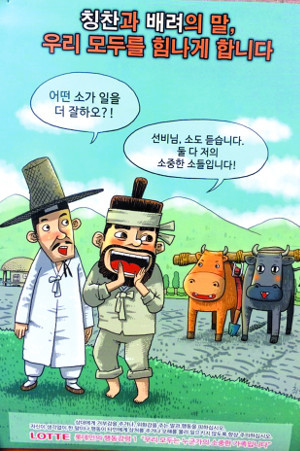Lotte Group, South Korea’s fifth-largest conglomerate, has come under fire after disclosing a poster featuring cows symbolizing employees, initially designed to encourage workers.
The poster, which was put up in March, shows “seonbi” asking a farmer which of his two cows is a harder worker, and the farmer replies “they are both my precious cows.”

A “seonbi” is a word used to refer to scholars during the Joseon dynasty, and the poster is a depiction of an anecdote about Hwang Hui, a 14th-century scholar and politician.
In the popular traditional tale, the farmer also whispers to the scholar singling out the better cow and explains that even animals have feelings.
While the moral of the original story is to be accepting of others’ faults, Lotte’s posters were immediately pulled down from the buildings of more than 80 Lotte affiliates after criticisms rose over its insensitive metaphor.
“We noticed that some people were feeling uncomfortable with the campaign. It was pulled down immediately,” group spokesman Park Sang-sub said.
Much like the English expression “work like a dog,” cows are used in the Korean language to describe very hard-working people or situations that demand strenuous effort.
However, such expressions also carry a negative connotation as cows were work animals, tools to be ordered and used.
“It was designed to tell employers that they should give more compliments to subordinates to motivate them to work harder,” the spokesman said.
Whether intended for good or not, employees at Lotte said they found the metaphor highly offensive.
“I wasn’t sure if the management was telling us to work like cows — being forced to work all the time and take orders passively,” a 31-year-old worker at Lotte Confectionery said, wishing to stay anonymous.
Some industry watchers said the poster was a disturbing tell-tale sign of the conglomerate’s corporate culture, and more broadly, Korean conglomerates as a whole.
“Even when there are wrongdoings at the top management level, employees have no choice but to keep silent (to keep their jobs). Due to this corporate culture, huge-scale wrongdoings keep occurring,” said Lee Hae-gwan, a former chair of a labor union at KT, a South Korean telecommunication company.
Peter A. Underwood, a business consultant and the author of “First Mover,” said in an interview with The Korea Herald last month that strict seniority and hierarchy in organizations have enabled the country to make a great economic leap in a short period of time, but it may be a great barrier for greater transformation.
However, this formula for Korea’s economic success is now an impediment as the country transitions into a creativity- and innovation-driven knowledge economy, he stressed.
By Suk Gee-hyun (monicasuk@heraldcorp.com)




![[Weekender] Korean psyche untangled: Musok](http://res.heraldm.com/phpwas/restmb_idxmake.php?idx=644&simg=/content/image/2024/05/02/20240502050841_0.jpg&u=)

![[Eye Interview] 'If you live to 100, you might as well be happy,' says 88-year-old bestselling essayist](http://res.heraldm.com/phpwas/restmb_idxmake.php?idx=644&simg=/content/image/2024/05/03/20240503050674_0.jpg&u=)










![[Herald Interview] Director of 'Goodbye Earth' aimed to ask how we would face apocalypse](http://res.heraldm.com/phpwas/restmb_idxmake.php?idx=652&simg=/content/image/2024/05/03/20240503050732_0.jpg&u=)
